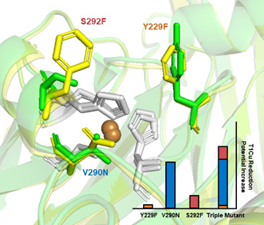Biocatalysis and Synthetic Biology
Biocatalysis has emerged as a promising method to address challenges in synthetic chemistry and synthetic biology to achieve high reactivity and selectivity. To expand the synthetic scope of biocatalysis, we aim to develop novel artificial biocatalysts that access new chemistry by protein engineering. Our strategies involve rational design, bioinformatic search, computational modeling and directed evolution. We start with computational modeling to mimic the structural features of the native enzymes within small and robust protein scaffolds. Once new reactivities are discovered, we further apply directed evolution to enhance the yield and selectivity. In past studies, we have achieved higher enzyme stability, greater production yield, deeper understanding of the enzyme mechanisms and new-to-nature reactivities. For example, we have demonstrated that incorporating unnatural amino acids (UAAs) and synthetic cofactors into small and compact protein scaffolds could lead to diversified reactivities. We are also designing biocatalysts to convert biomass to value-added products, for example, lignin degradation, polysaccharide degradation and polyketide generation.





One prominent feature of synthetic biology is to utilize engineered microbial hosts rather than in vitro enzyme reactions to produce desired compounds. Since we have successfully designed and engineered a number of biocatalysts, we are aiming to combine these artificial biocatalysts with the metabolic network of different hosts, such as E. coli, yeast and model plants. These hosts carrying exogeneous reactivities can generate valuable products in a one-pot fashion without the need of enzyme purification and intermediate isolation. For instance, we were able to incorporate a polyketide generation pathway in E. coli by co-expressing the engineered biocatalyst, achieving one of the highest reported styrylpyrone production systems.
